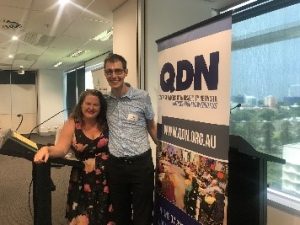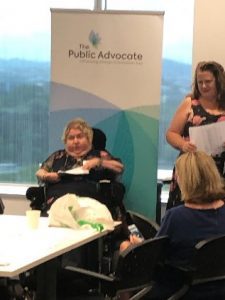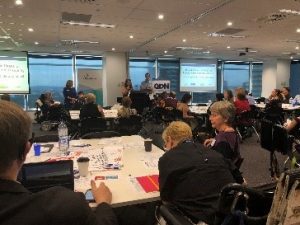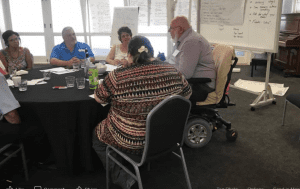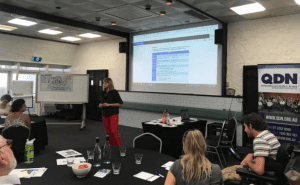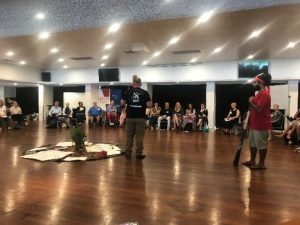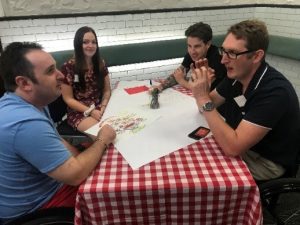Bi-monthly update – March 2019
Please click below to listen to an audio of a shortened version of the March 2019 e-bulletin.
From the Chairperson
The Federal Election is just a few months away. QDN has prepared a Federal Election Platform document outlining the key issues for Queenslanders with disability. The document will come out this week. Almost one in every five Queenslanders has a disability, that’s almost 900,000 people, and only approximately 91,000 of these people are expected to enter the National Disability Insurance Scheme (NDIS) as participants in Queensland by July 2019 (ABS 2012). QDN members and our supporters have been telling us what is important to them, and fundamentally, it is about upholding our rights as equal citizens in our Australian community. Important to us is having a place to call home, being able to get quality, affordable and accessible health care, to get around our communities in accessible, affordable transport, real jobs for real pay and truly being included in our education systems. The Commonwealth Government and our elected members of parliament have a responsibility to deliver and fund essential accessible, affordable and quality Government and community mainstream services to people with disability.
The Australian Government also has a responsibility to ensure that the NDIS is implemented in a way that truly does give people access to the supports they need to live their life included, and part of community. We know that to date, approximately $6 billion from the NDIS has been returned unspent to the budget, including over $2.5 billion in 2017-18 alone. As the Federal Budget is brought down this week, it is critical that the funding that has been committed for people with disability continues to be invested in people with disability.
I encourage all members and our supporters and allies to engage with their local candidates to talk to them about what are the critical things in the lives of people with disability that we want to see changed. Good luck to all the candidates, and QDN looks forward to working with the elected Federal Members of Parliament and Senators to ensure delivery of an inclusive Australian community where it really is ‘nothing about us without us’.
At this point in time, with just 3 months before our 3 year NDIS transition period finishes, there are still more than 30,000 Queenslanders with disability who were expected to get supports under the NDIS who have not accessed the scheme. We know there are a variety of reasons for this. There are still people standing back, there are some people who have tried to access and been denied access, and there are people who are just not sure what they need to do. Through QDN’s work by and for people with disability focusing on NDIS participants over the past 5 years, we know there one of the key things people need is hands on targeted support and information to assist them in making their access request. I am very proud of the work QDN has been doing in this space, with most recently the NDIS Peer to Peer Advocacy Project funded by the Queensland Government. We know it is important to continue this work to enable everyone access to the hands on support they need, provided in accessible and informative ways.
Finally, this needs to be the “Decade of Delivery” on the outcomes of national disability policy and strategy. Members would be aware that there has been a lot of change to disability policy and service delivery in the past decade. The recent Productivity Commission Report reviewing the National Disability Agreement has made recommendations to how this policy architecture all works together. The National Disability Strategy is an important part of this, and the recent independent review showed that the Strategy needs updating and there were suggestions for areas for improvement, particularly on how the strategy is implemented. Minister Fletcher has asked the Department of Social Services to conduct consultations around the National Disability Strategy. I encourage QDN members to participate and have your say. There is more information in the e-bulletin about where to go to find out more. Let’s make the next 10 years, the decade of delivery and the National Disability Strategy something that delivers real change and achieves the aspirations and change that we want to see to make a difference in people’s lives.
Nigel Webb, QDN Chairperson
From the CEO
On behalf of everyone at QDN, we would like to send our best wishes for a safe and quick return to normal to those affected by the recent weather in North Queensland, Far North Queensland and the West. We are thinking of all those who are impacted and whose lives are significantly disrupted by these weather events. QDN is aware that a number of our members have been affected, which is significantly impacting their lives. QDN wishes you all the best in keeping going under such difficult circumstances and the extensive clean-up and rebuild which will follow.
QDN commends the Palaszczuk Government for taking the very important step in Queensland’s history in passing legislation, which will serve to protect the human rights of all Queenslanders, including almost 900,000 Queenslanders with disability. The Human Rights Bill, passed in Parliament, protects 23 fundamental human rights and establishes responsibilities by public entities making decisions that impact on the rights of all Queenslanders. Human rights are fundamental to people with disability in achieving full and equal citizenship, and equal access to the same employment, health, housing, education, justice, transport, cultural, sporting, and recreational activities as everybody else. I am very pleased to see this legislation passed by the Queensland parliament, and thank the Palaszczuk Government, and Attorney General Yvette D’Ath for their leadership in bringing forward this historic reform.
This week QDN was pleased to bring together 15 of our Local Group Convenors from around the state to, share stories and spend time thinking about the purpose and power of peer support and peer networks. The Local Support Groups, led by people with disability for people with disability have had a primary focus over the past 4 years on peer support around learning about the NDIS and how to access it. Whilst this is still an important focus for many of our groups who are still in the last stages of transition, now that people are in the scheme, attention is starting to shift to ‘now I have my plan, what do I do? Where do I go? Who do I talk to? How do negotiate with my service provider to get what I need and want? Or My plan review is coming up, how do I get ready for that?’ Groups also focus on the important issues about inclusion, human rights and mainstream issues like housing, health, transport, education, and employment. Peer networks serve a very important purpose – to share information, provide mutual support and social connection, and a way for people to engage together to bring about change in their own lives and in their communities. The QDN Local Support Groups, which are in communities all around Queensland, look forward to continuing to work together with people with disability and continue to grow their groups.
Following the Local Group Convenor gathering, QDN in partnership with Queensland Council of Social Services (QCOSS), Anti-Discrimination Commission Queensland (ADCQ) and Purpose Partners hosted a two day leadership development for 60 people, including 21 QDN members, who came from all corners and parts of the state, with a focus on being agents of social change. This work has grown out of the Changing Lives Changing Communities forums that QDN, QCOSS and ADCQ have hosted over the past year, working together to create communities where everyone contributes, matters and belongs. The diversity, knowledge and leadership that came together over the two days was extraordinary and we look forward to continuing to work with this group of change leaders over the coming year and into the future.
Finally, resolution is needed on the mainstream interface issues with the NDIS, particularly the Taxi Subsidy Scheme (TSS). Commonwealth, State and Local Governments all have a responsibility to citizens to provide accessible transport. The TSS was established in 1987 by the Queensland State Government to deliver on their obligation to ensure Queenslanders have accessible transport options. To date, the Queensland Government made a commitment to continue the TSS for all Queenslanders including NDIS participants until 30 June 2019. At this point, this issue is still unresolved and we call on QDN members and our allies and supporters to join with us to ensure that everyone can access the TSS beyond 30 June 2019.
This month we farewelled our Projects Lead Denise Sands who has been with QDN for the past three years, who is off to travel around Australia. We wish you safe travels Denise. We also farewelled Peter Parkes and Jo Walters and we warmly welcome Melissa Hill who has commenced with QDN in the role of Projects Lead, and Mike Fisher and Jo Cochran who join the NDIS Peer to Peer Advocacy team.
Paige Armstrong, CEO
Vale: George Dougherty
We were saddened to hear of the recent passing of long-term QDN member George Dougherty. George, alongside his loving wife Hazel, was known for his advocacy and commitment to people with disability living good lives in the community and having the support to do so. George was involved in the early gatherings of QDN and regularly strategized on key issues with good friends Bill Garsden (QDN’s inaugural President) and Robert Jones (another founding member of QDN, now also deceased). George was also a long-term member of Spinal Life Australia. George will be remembered for his determined, quietly spoken manner in his efforts to work with others to achieve change. In more recent times, George was a regular member of the Brisbane Local Support Group, attending meetings at Bowen Hills and contributing his wisdom. George will be missed and QDN extends our sincerest thoughts to Hazel and George’s family at this time.
QDN Media Releases and News summary
Media Releases
General News
Royal Commission Draft Terms of Reference Released and Open for Comment
Contact numbers for urgent assistance in flood recovery
Closure of Halwyn Centre at Red Hill
Check us out on social media
QDN invites you to keep up to date with our work on:
Twitter QLDDisability Network
Facebook Queenslanders with Disability Network
Instagram qdnorg
Roundtable on Health and Intellectual Disability: Upholding the right to health and life
On 22 March, QDN in partnership with Office of the Public Advocate (OPA), Queensland Centre for Intellectual and Developmental Disability (QCIDD), ICAN! – Institute for the Clinical Advancement of Neuroplasticity and supported by Australasian Society for Intellectual Disability Queensland Division (ASID) hosted over 80 people at this Roundtable. The Roundtable brought together people with intellectual disability, families with key decision makers, experts, professionals across health, disability, advocacy, and justice systems to look at the current environment in Queensland across health and disability, especially as we transition to the NDIS. There are over 400,000 people in Australia who have intellectual disability. Including their families, two million Australians are impacted. They experience stark and costly health inequalities including over twice the rate of avoidable deaths and hospital admissions that cost twice as much, as well as lower rates of preventative health care. The Roundtable speakers included: Sharon Boyce (Chairperson Queensland Disability Advisory Committee), panel of speakers with lived experience including Willie Prince, Michael Cherry and Kim and Jae Creevey, Mary Burgess (Queensland Public Advocate), Paige Armstrong (CEO QDN), Professor Nick Lennox (UQ- QCIDD), Professor Harry McConnell (Griffith University) and Jim Simpson (NSW Council of Intellectual Disability). The speakers called on change across the health and disability systems and for us to think about different ways of ensuring that people with intellectual disability get access to quality health care. The Roundtable participants have identified a number of key actions and strategies to take forward, and QDN looks forward to continue to work with our members, partners, allies and State and Commonwealth Governments to progress these actions and make a difference in the lives of people with intellectual disability and their families. A big thank you to our Masters of Ceremonies on the day QDN member Alex Baker and Nance Haxton – Wakerly award winning journalist, and The Wandering Journo.
QDN Local Support Group Convenor Day
On 26 March, 15 local group convenors came together in Brisbane to connect together about the positive work they are doing in their communities, and share ideas, information and reconnect with purpose and where we are heading into the future. The Local Group Convenors shared their strong commitment to ensuring people with disability have the opportunity to come together in a safe environment, where they are valued as equals to get information, give information, connect with each other, provide support, and work together on the key things that are important to the members of that group.
There are 20 groups across Queensland who meet together regularly, both face to face and virtually, connecting more than 1000 people together about things like the NDIS, housing, justice, health, work, transport. Stay tuned for the short video that we shot that will be coming soon about the groups and our work.
Changing Lives, Changing Communities
On 5 and 6 March QDN and QCOSS co-facilitated the Changing Lives Changing Communities forum on the Gold Coast, the fifth forum held so far in the series of six locations across Queensland. This forum came together with the support and input of local organisations and individuals in the community and QDN members and Local Support Group Convenors Bev and Warwick Best and Rob Ellis. Over the two days more than 90 people from the Gold Coast community came together to explore the question ‘what would it take to create a Gold Coast community where everyone contributes, matters and belongs?’

We heard from a number of inspiring speakers from the Gold Coast who shared stories of their work in creating a more inclusive Gold Coast community, and what inclusion means to them. These stories came from a range of diverse organisations, businesses and individuals on the Gold Coast. From a bakery owner who spoke about their employment and training program for people with disability, a young woman advocating for better inclusion of people with disability in public spaces and at music events, to the story of gentleman who participates in, and teaches others the sport of wheelchair motocross (WCMX).
Over the course of day 2, participants co-developed 11 innovative ideas and projects for action to improve the inclusion of people and for everyone, that reflected the diverse interests and needs of the Gold Coast community.
Community Champions Leadership Development – 27 and 28 March 2019
Building on the outcomes from the Changing Lives, Changing Communities work, QDN, QCOSS, Anti-Discrimination Commission Queensland and Purpose Partners, came together over two days last week with around 70 Community Champions to build leadership and capacity to courageously tackle the question, “what will it take for us to be champions of social change in our communities”?
This workshop focused on leadership development for QDN members and Queensland citizens, learning about the art of hosting and harvesting conversations that matter. As a group of community leaders, participants have built strong connections, relationships and knowledge as champions of social change in their own communities.
Ongoing development opportunities and a community of practice (COP) will provide the building blocks for the community champions and working together to create Queensland communities where everyone contributes, matters and belongs.
QDN Members present at the Disability Support Workers Conference
Congratulations QDN members Donna, Paul and Alex and our VALID colleagues Heather and John on your fantastic presentation at the Disability Support Workers conference on 19 and 20 February at the Brisbane Convention Centre on the past, present and future of self advocacy – the long and winding road.
Simple Acts, Big Impacts
By QDN Member and NDIS Peer to Peer Advocate, Stephane Dower
In January 2019, Premier Anastasia Palaszczuk declared the new Screen Queensland Studios open for business in Hemmant. While these studios are designed to bring more screen production activity to the region and create more jobs for local practitioners, they also provide a unique opportunity for practitioners with disability thanks to a simple question during the planning stage of the studios: is there anything accessibility-wise that should be implemented?
People with disability are one of the most underrepresented groups seen on cinema and television screens both here in Australia and around the world. One factor that contributes to this is the lack of disabled people working behind the scenes of popular film, television and streamed content. Without the inclusion of such voices contributing to the production of screen content, audiences are offered limited and often misguided representations of people with disability. With recent calls for more diversity and accurate representations in mainstream media, suddenly people, who have previously been kept out of the industry, are discovering new opportunities to have their voices shared.
My passion for screen production began in high school which led me to pursue it in my tertiary studies and eventually make a career out of it. The actuality of working in this industry has lead me to interact and work with a wide range of industry figures, including the person charged with developing and designing the new Screen Queensland Studios. During a conversation he asked me a question: is there anything accessibility-wise that should be implemented? This simple yet important curiosity is what is going to change the screen industry and make it more inclusive for people with disability. By being asked such a question and having my opinion influence the design of the studios, I felt included and valued as a practitioner. Having local studios that include accessibility features not only opens up employment opportunities for myself, but for many other practitioners with disabilities out there.
The simple act of doing the work that I love and developing the projects I want to see seems to cause a ripple effect of accessibility across the industry proving that simple acts can lead to big impacts.
Policy Work
Our Voice – have your say
Terms of Reference for a Royal Commission into Violence, Abuse, Neglect and Exploitation of People with Disability
QDN welcomes a public consultation on the draft Terms of Reference for a Royal Commission into Violence, Abuse, Neglect and Exploitation of People with Disability.
A public survey has been released seeking people’s views on what should be covered in the Terms of Reference. A link to the Terms of Reference can be found here.
QDN is aware that people with disability, particularly those living in a group environment or congregate care are at higher risk of being abused. Our community and our Governments have a responsibility to understand the experiences of people with disability and to provide adequate responses that ensure the safety of all people. The survey closed on 28 March, and QDN also provided a formal submission to Minister Fletcher about the Royal Commission.
Help Shape the future of disability policy for 2020 and beyond
The National Disability Strategy 2010-2020 is about creating a more inclusive society that enables Australians with disability to fulfil their potential as equal citizens. It is also the main way Australia implements the United Nations Convention on the Rights of Persons with Disabilities in Australia, making sure people with disability can participate in all areas of Australian life. The Strategy is a shared commitment by all governments to work together to improve the lives of Australians with disability by guiding governments and other organisations to build the wellbeing of people with disability and their carers. At the end of 2020 the Strategy will finish, and governments across Australia are working together to develop a new strategy for beyond 2020.
From April, the Australian community is invited to take part in national consultation to shape the future of disability policy for 2020 and beyond. It is really important people with disability are included in this national consultation. Consultation will ensure people with disability are at the centre of the design of the new strategy and have a leading role in modernising policies and programs affecting their lives.
The first stage of consultation takes place between April and June 2019. There will be a range of options available to ensure you can have a say. Importantly, all consultation will be accessible to people will disability.
How you can have a say
You can have your say through:
- an open public survey (available from mid-April)
- face-to-face community workshops in every state and territory (beginning 29 April)
- an online forum (beginning from mid-May).
For more information on the consultation go to www.engage.dss.gov.au
QDN will keep members updated as the Review progresses.
You can read more on the Productivity Commission’s Review of the National Disability Agreement and download the Study Report here
Sign petition to extend Taxi Subsidy Scheme for Queensland NDIS participants
QDN is encouraging members to sign an e-petition to extend the Taxi Subsidy Scheme (TSS) for Queensland NDIS participants. This is part of a broader strategy by a collective of organisations including: Vision Australia, Blind Citizens Australia, Spinal Life, Endeavour Foundation, Muscular Dystrophy Foundation, Multiple Sclerosis Queensland and others to keep the TSS. You can sign the petition here
The Royal Commission into Aged Care Quality and Safety – Make a submission
The Royal Commission into Aged Care Quality and Safety invites interested members of the public and institutions to make submissions to the Royal Commission using an online form. The Royal Commission will continue to accept submissions until at least the end of June 2019. A date for the closing of submissions will be announced in the second half of 2019.
The online form is designed to capture information that is relevant to the work of the Royal Commission and consistent with the areas of inquiry set out in the Royal Commission’s Terms of Reference.
The Royal Commission is using one form for all submissions. Not all questions will be relevant to every person or entity making a submission.
Read more and see how to make a submission here
Policy updates
NDIS
National Day of Action – 3 May
Every Australian Counts will be holding a National Day of Action on 3 May 2019. They want as many individuals and organisations as possible to hold an event, contact the media or talk to their local MP or candidates on that day.
They will be holding some ‘Make it Work’ forums around the country and hope lots of other people will commit to doing something in their own local communities that day too.
There will be more details on our website soon. Click here to read more.
Funding Extended to Advocacy Groups for NDIS Appeals
The Australian Government recently announced $6.5 million to boost funding for National Disability Insurance Scheme (NDIS) Appeals providers and to continue the National Disability Advocacy Program (NDAP) Decision Support Pilot.
This $5.3 million in funding will ensure NDIS participants can access support when seeking a review of decisions in the Administrative Appeals Tribunal (AAT). The $1.2 million for the NDAP Decision Support Pilot will continue decision-making support for people engaging with the NDIS who have limited decision-making capacity and no alternative decision-making support such as family, friends or a guardian.
More information on NDIS Appeals is on the Department of Social Services website:
Simpler process to replace assistive technology under the NDIS
National Disability Insurance Scheme (NDIS) participants will find it easier to replace their Assistive Technology (AT) to enable them to continue to pursue their goals following the introduction of simpler processes. Replacement for standard AT items will be quickly assessed by the National Disability Insurance Agency (NDIA) without needing a full re-assessment, and will only require one quote for items valued between $1,500 and $15,000. Read the full media release here
Housing
Understanding Specialist Disability Accommodation Funding
A study by the Australian Housing and Urban Research Unit (AHURI) examined the Specialist Disability Accommodation (SDA) program and the attitudes of industry to investment and participation in that program. It questioned developers, investors, housing providers, prospective tenants and governments on how the SDA program will generate new supply that meets the needs and preferences of people with disability.
The research found the provision of SDA housing for people with disability was welcomed by the property sector, large financial institutions, specialist financial institutions, community housing providers, and disability service providers. There were barriers to SDA housing concerning eligibility and knowledge of supply and more than 100 for-profit sector and not-for-profit enterprises are engaged with SDA and there is potentially sufficient private capital to enable large-scale investment.
Members of the NDIS Specialist Disability Accommodation Reference Group Announced
Minister for Families and Social Services, Paul Fletcher, and Assistant Minister for Social Services, Housing and Disability Services, Sarah Henderson, recently announced the members of the new National Disability Insurance Scheme (NDIS) Specialist Disability Accommodation (SDA) Reference Group. The Government announced the establishment of the SDA Reference Group in February 2019 as part of a suite of reforms to improve investor confidence and increase the supply of SDA for eligible NDIS participants. At full Scheme, the NDIS is expected to provide around $700 million per year to participants to access high quality, fit-for-purpose housing in a variety of configurations to suit people’s needs and preferences.
Read more here
Make Renting Fair
Recently a broad group of community-based organisations launched the Make Renting Fair in Queensland campaign for progressive tenancy law reforms. Click here to read more
Specialist Disability Accommodation (SDA) Update for members
Further to QDN’s media release on Specialist Disability Accommodation, QDN Members can get additional and more in-depth information around SDA on the QDN Member Hub. The Disability Reform Council (DRC)[1] recently announced the outcomes of the SDA Framework Review and the actions that will be taken to make SDA Housing available to people with disability who are eligible. The National Disability Insurance Scheme (NDIS) has also recently released a new Price Guide. This complements the SDA Framework Review. QDN Members, go to the Member Hub to read more.
Health
QDN connects with NSW Council for Intellectual Disability
QDN along with our allies NSW CID met with Terri Butler to talk about the health of people with intellectual disability Council for Intellectual Disability and Terri Butler MP
This work is part of a national campaign #ourhealthcounts and work has been happening across Australia to meet with Federal Ministers, Shadow Ministers and Federal Members of Parliament to talk about the health of people with intellectual disability and what can be done to change the inequalities. More information can be found on our website, and there is a letter signed by 120 eminent Australians, including QDN CEO and members calling for change.
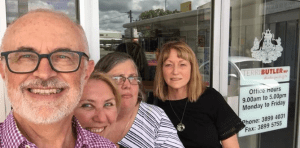
Human Rights
Voices Together website live
The Voices Together Website is LIVE. If you are a Self Advocate then click here to go to the page.
International Women’s Day
Women around the world continue to face daily challenges in living, working and sometimes, surviving. Women with disability are even more adversely affected by human rights issues, coming up against greater barriers in accessing education, work and employment, and their experience of family and reproductive rights, and health. QDN celebrates the lives and achievements of women with disability every day, as well as the people who support them.
QDN members and other disability service organisations across Australia are doing important work to support women with disability, and the majority of workers in these organisations are women themselves!
Human Rights Act passed into law
The Human Rights Act was passed into law by the Queensland Parliament on 27 February 2019. The Human Rights Act protects our rights to freedom, respect, equality and dignity. The law says we all have the right to access health care and our children have the right to access an education. The Human Rights Bill, passed in Parliament, protects 23 fundamental human rights and establishes responsibilities by public entities making decisions that impact on the rights of all Queenslanders.
The Act will commence operation in two phases. On 1 July 2019, the Anti-Discrimination Commission will be re-branded as the Queensland Human Rights Commission. From 1 January 2020, the complaints mechanism will commence, which will allow people who consider that their human rights have been violated by a public entity to lodge a complaint directly with the Commission. We know from experience and research, that people with disability have a higher vulnerability and experience of discrimination, bullying, and violations of human rights. This is something that happens in all parts of people’s lives. It is positive to see economic, social and cultural rights to education and health are included in the Bill. QDN members identify experiences of discrimination and lack of equal access to education and health as important issues so I am pleased to see these included. This builds upon reforms in other states, and puts Queensland out in front.
QDN looks forward to working with Queenslanders with disability, the Human Rights Commission, Government and our allies and supporters in the implementation of this legislation, and the realisation of human rights of all Queenslanders.
Community Inclusion
Issues for people with vision impairment accessing the NDIS
Listen to this report from the ABC Radio National outlining issues people with vision impairment have experienced accessing the NDIS: https://www.abc.net.au/radionational/programs/breakfast/ndis-under-fire-from-vision-impaired-australians/10848868
Inclusive Tourism: What to do in Australia?
Austrade recently commissioned a report into accessible tourism in Victoria and Queensland. It shows Australia is missing out on both international and national tourism opportunities. This report demonstrates a community-wide approach is needed where operators of venues, accommodation, attractions and destinations work together. You can download the report and find more information here.
Energy
Scheme helps Queensland families drive down energy bills
Up to 4000 families from Cairns, Townsville, Rockhampton, Hervey Bay and Toowoomba will soon have a chance to cut their power use and their power bills with the latest Palaszczuk Government energy affordability initiative. The program has been postponed in Townsville until April due to the floods.
Energy Savvy Families is part of the Government’s $2 billion Affordable Energy Plan, along with:
- a two-year cap on electricity price rises to average inflation
- $50 annual rebate over two years for every Queensland household
- grants for energy-efficient appliances
- Interest-free loans and grants to install rooftop solar and batteries.
Read more here.
Affordable Living
QCOSS Report: People on income support are struggling to afford basics
According to a recent report released by QCOSS, Living affordability in Queensland, people on income support are under increasing financial pressure to afford the basics like housing, food and essential services. The report compares the basic standard of living across five locations in Queensland – Cairns, Mount Isa, Rockhampton, Toowoomba and Brisbane – to see how location and income impact on cost of living. The locations were chosen as they include metropolitan and regional areas. The report focusses on four low-income households, recognising that people surviving on low incomes are struggling the most. Read more here.
NDIS Peer to Peer Advocacy
From the Sunshine Coast to the Gold Coast the Peer to Peer Advocacy team have been working hard to provide advocacy and support for people with disability who are making access requests to the National Disability Insurance Scheme (NDIS). Since July 2018 the team have provided support, both individual and small group, to almost 900 people with disability. The majority of requests for support have been from people who have had no disability services or have had some community care services previously. Of the referrals made to the team the main request has been from people wanting to put in their first access request.
The Peer to Peer Advocacy team offers people with disability the opportunity to receive individualised advocacy and support with their access journey. Team members walk alongside each person helping them to gather the evidence they need to submit an access request and hopefully receive support through the scheme. The team understands that this process is complex and sometimes daunting which is why our approach also endeavours to build individual knowledge and capacity along the way.
The collaborative approach that the Peer to Peer Advocacy project has built – walking alongside a person with disability – has assisted a number of people in building their confidence, enabling them to dream and build goals for the future, and see (sometimes for the first time) supports being put into place in their lives that will be life-changing.
If you would like support or know someone that would like support with your access journey, please contact the Peer to Peer Advocacy team. We are here to help
QDN’s NDIS Peer to Peer Advocacy service is free. Please call QDN and we can organise to meet with you and work with you on your NDIS journey.
Local Support Group Update
Zooming into the New Year
QDN has zoomed into the New Year with new video conferencing technology and it has been great that we can connect in this way and bring a different perspective to our meetings. QDN continues to support the work of all Local Support Groups and Group Convenors in 2019! We will be exploring new ways of working with you all that enables you to strengthen relationships within your groups and communities, and continue to shape and influence your local communities through leadership by and for people with disability.
Interesting guest speakers: beyond the NDIS
The topic of the NDIS is still of keen interest for many group members and some groups have had their biggest meetings ever with new members attending. Five groups have invited the Local Area Coordinators to attend their first meetings, and the response from members has been positive with them getting most of their questions answered.
QDN is also supporting the groups with staff from the Peer to Peer team who have agreed to attend meetings to offer advice and planning around NDIS access, which is a great resource and offering to people in this last period of transition. In the Brisbane City Council Local Government Area, diversity officer Ryan Foster is attending some of the local group meetings in March to receive feedback around the Brisbane city inclusion plan. This includes transport issues with a focus on ferries, and other access needs.
Sunshine Coast LSG is looking forward to a guest speaker from Tech Aids for the Disabled.
Brisbane Local Support Group had some discussions around the Royal Commission into disability abuse, the terms of reference, scope and timing. This is something that has been long in coming and QDN welcomes this initiative.
2019 is already shaping up as a busy year and we welcome and need your involvement! It is through your involvement and sharing of what is happening on the ground that we can all contribute to informing decision makers about what is going on to deliver good outcomes in local communities. Through gathering the communications and discussions of members, QDN is then able to identify burning issues by and for people with disability and take these forward to decision makers to be able to influence change.
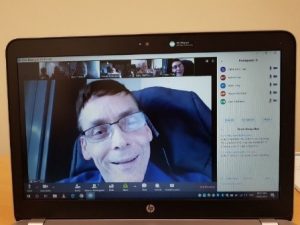
Member Profile
Rob is a QDN member, local support group convenor, and is now an NDIS participant, thanks to the work of Rob and support and advocacy from QDN’s Peer to Peer Advocacy project. This is Rob’s story. My NDIS journey began in 2018 when I first tried to access the NDIS. I took it upon myself initially to go through the process of accessing the NDIS. I went through the mental health department and they did an assessment on me. I was so unsure if I would get into the scheme and that was very daunting. The doctors and specialists that I was required to go and see to fill out the NDIS forms really didn’t know what the NDIS was all about and they didn’t seem to understand the forms. There were about 12 forms to fill out just to get over the line.
Because the team who worked with me at the hospital only see such a small part of my life, they didn’t understand what my life is really like. I have good days and bad days, just like everyone does. I really wanted choice and control in my life, but it was a long haul.
I had over two months of form filling, then the forms were submitted, and I waited for the assessment to come back. My NDIS access was rejected. I wondered how I was ever going to get choice and control in my life.
I began to question whether I was disabled enough to access the NDIS, though in truth I knew in my heart I was. Some time passed and I decided to talk to QDN about my situation. As a leader in my community, I really wanted to get the confidence and determination to have another shot at this. It was very daunting for me and I worried a lot about it.
I got in touch with QDN and one of the staff from the Peer to Peer Advocacy team came to see me. She talked me through the access process and said she thought we should have another go. She said ‘I can’t promise you but we’ll see if we can get more evidence’. The QDN Peer to Peer team organised, through my psychologist, for them to do another assessment. The team also helped me gather further evidence from Queensland Health and my previous Occupational Therapy report. Once the assessment from the psychologist came back, I booked in to go to my doctor again and thankfully the NDIS peer to peer advocacy project worker from QDN came with me. She supported me at the doctor to get the forms completed. Since I’ve done that the doctor has asked for the Peer to Peer contact details to help get other people NDIS access. I was so pleased to have the Peer to Peer support with me through this process. I definitely wouldn’t have had the courage or knowledge to do this on my own. It would just have been too much for me.
We went over the paperwork and then the Peer to Peer team submitted all the paperwork on my behalf. I didn’t really want to get my hopes up. After 21 days (I know ‘cause I was counting!), I received a phone call from Carers Queensland to say my access request to the NDIS had been approved. I was cautiously excited.
The QDN project officer then met me again and we talked about what I want in my NDIS plan. She went away but I phoned her a few times to check on different things. We went to the planning meeting together, which was very frightening at first. But as the meeting went on, I relaxed a bit. It went for nearly two hours. I was worried but it was great to have someone with me, and I’m not sure I would have done it without her. It would have been put in the too hard basket.
I’m now waiting to hear what parts of my plan will be approved. The NDIS will change my life big time. It will take a lot of stress off me. Having some sort of support if you’re having a crisis and having troubles is really important. I’m hoping it will change things. Not that I want everything to be done for me. I want things to change so that I can learn how to do things myself. I’m really looking forward to a life with more choice and control, thanks to the Peer to Peer Advocacy team.
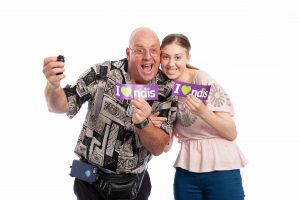
From our Friends
National Elder Abuse Conference Registrations Now Open
ADA Australia and Caxton Legal Centre are excited to announce registrations for the 2019 National Elder Abuse Conference (NEAC) are now open!
Register to attend the conference today.
Contact Us
Who’s who in the QDN office
Paige Armstrong CEO
Michelle Moss Business Development & Administration Manager
Melissa Hill Projects Lead
Margaret Micale Project Support Officer
Leigh Elliott Policy Officer
Lou Abson Project Officer
Karin Swift Policy / LSG
Angela Boyd Peer to Peer Project
Kate Burton Peer to Peer Project
Jo Cochran Peer to Peer Project
Rebecca Wesson Peer to Peer Project
Rebecca McElroy Local Support Groups
Sharon Turner Reception
Mark McKeon Finance Officer
Sharyn McManus Communications & Media

